

Most ebook files are in PDF format, so you can easily read them using various software such as Foxit Reader or directly on the Google Chrome browser.
Some ebook files are released by publishers in other formats such as .awz, .mobi, .epub, .fb2, etc. You may need to install specific software to read these formats on mobile/PC, such as Calibre.
Please read the tutorial at this link: https://ebookbell.com/faq
We offer FREE conversion to the popular formats you request; however, this may take some time. Therefore, right after payment, please email us, and we will try to provide the service as quickly as possible.
For some exceptional file formats or broken links (if any), please refrain from opening any disputes. Instead, email us first, and we will try to assist within a maximum of 6 hours.
EbookBell Team

4.8
14 reviewsWhether motivated by humanitarianism or concern over "porous" borders, dominant commentary on migration in Europe has consistently focused on clandestine border crossings. Much less, however, is known about the everyday workings of immigration law inside borders. Drawing on in-depth ethnographic fieldwork in Italy, one of Europe's biggest receiving countries, Rules, Paper, Status moves away from polarized depictions to reveal how migration processes actually play out on the ground. Anna Tuckett highlights the complex processes of inclusion and exclusion produced through encounters with immigration law.
The statuses of "legal" or "illegal," which media and political accounts use as synonyms for "good" and "bad," "worthy" and "unworthy," are not created by practices of border-crossing, but rather through legal and bureaucratic processes within borders devised by governing states. Taking migrants' interactions with immigration regimes as its starting point, this book sheds light on the productive nature of legal and bureaucratic encounters and the unintended consequences they produce. Rules, Paper, Status argues that successfully navigating Italian immigration bureaucracy, which is situated in an immigration regime that is both exclusionary and flexible, requires and induces culturally specific modes of behavior. Exclusionary laws, however, can transform this social and cultural learning into the very thing that endangers migrants' right to live in the country.